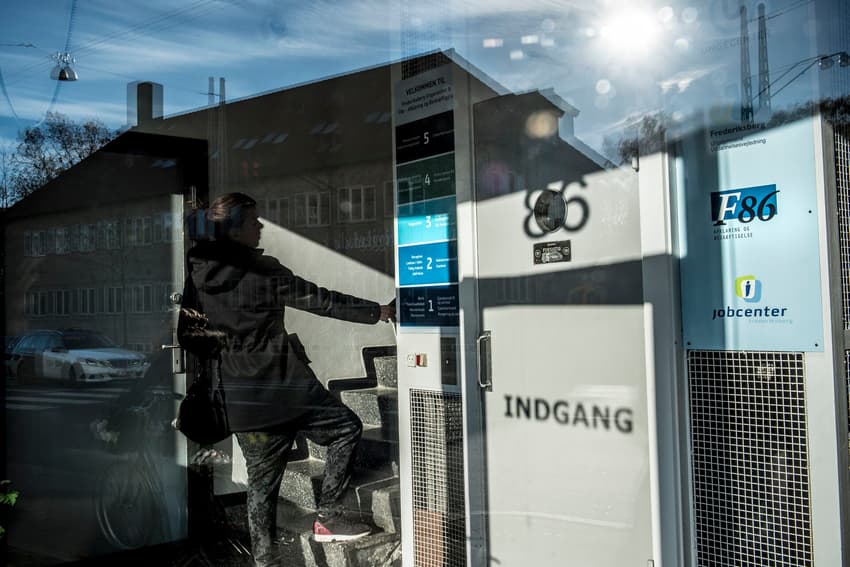Denmark cuts basic benefit for 10,000 unemployed immigrants

An agreement between the government and three right wing parties will cut a basic welfare payment for around 10,000 people who immigrated to Denmark before 2008 and are unemployed.
The so-called beskæftigelseskrav, which previously only applied to people who moved to Denmark after 2008, will now also apply to immigrants who arrived before that year, an additional 10,000 people, the Ministry of Employment said in a statement.
The rule states that a person must have worked full time for at least two and a half years, within the last 10 years, to be eligible for the basic unemployment benefit, kontanthjælp.
Following the rule change announced on Thursday, people who don’t meet this criteria (if they are not Danish nationals) can only receive the lower selvforsørgelses- og hjemrejsesydelse (literally: “self-support and return home benefit”), formerly known as integrationsydelse.
Each of these forms of unemployment benefit are distinct from the higher safety net of dagpenge, which requires membership of a semi-private A-kasse unemployment insurance provider.
READ ALSO: Who is eligible for Danish unemployment benefits?
The parties with which the government has agreed to tighten the rule are the Conservatives, Liberal Alliance and Denmark Democrats.
“Too many people have come to Denmark and gone around on social welfare for many years without working. We cannot accept this,” Employment Minister Ane Halsboe-Jørgensen said in the statement.
The ministry said in the statement that the additional scope of the employment criteria will primarily impact “non-Western immigrants who have been in Denmark for many years”.
Immigrants from all EU countries, along with Andorra, Australia, Canada, Iceland, Liechtenstein, Monaco, New Zealand, Norway, San Marino, Switzerland, the United States, the United Kingdom and the Vatican are considered ‘Western’ by Danish authorities. Everywhere else is ‘non-Western’.
Economy Minister Jakob Ellemann-Jensen, the leader of the Liberal party, said Denmark must “meet people with an expectation that you both can and will work”.
“That’s why we agree on a stricter accrual rule for all persons who came to the country before 2008 – just as that applies to those who came after that,” he said.
“This tightening means more will be incentivised to take a job. That’s the right way to go,” he said.
Comments
See Also
The so-called beskæftigelseskrav, which previously only applied to people who moved to Denmark after 2008, will now also apply to immigrants who arrived before that year, an additional 10,000 people, the Ministry of Employment said in a statement.
The rule states that a person must have worked full time for at least two and a half years, within the last 10 years, to be eligible for the basic unemployment benefit, kontanthjælp.
Following the rule change announced on Thursday, people who don’t meet this criteria (if they are not Danish nationals) can only receive the lower selvforsørgelses- og hjemrejsesydelse (literally: “self-support and return home benefit”), formerly known as integrationsydelse.
Each of these forms of unemployment benefit are distinct from the higher safety net of dagpenge, which requires membership of a semi-private A-kasse unemployment insurance provider.
READ ALSO: Who is eligible for Danish unemployment benefits?
The parties with which the government has agreed to tighten the rule are the Conservatives, Liberal Alliance and Denmark Democrats.
“Too many people have come to Denmark and gone around on social welfare for many years without working. We cannot accept this,” Employment Minister Ane Halsboe-Jørgensen said in the statement.
The ministry said in the statement that the additional scope of the employment criteria will primarily impact “non-Western immigrants who have been in Denmark for many years”.
Immigrants from all EU countries, along with Andorra, Australia, Canada, Iceland, Liechtenstein, Monaco, New Zealand, Norway, San Marino, Switzerland, the United States, the United Kingdom and the Vatican are considered ‘Western’ by Danish authorities. Everywhere else is ‘non-Western’.
Economy Minister Jakob Ellemann-Jensen, the leader of the Liberal party, said Denmark must “meet people with an expectation that you both can and will work”.
“That’s why we agree on a stricter accrual rule for all persons who came to the country before 2008 – just as that applies to those who came after that,” he said.
“This tightening means more will be incentivised to take a job. That’s the right way to go,” he said.
Join the conversation in our comments section below. Share your own views and experience and if you have a question or suggestion for our journalists then email us at [email protected].
Please keep comments civil, constructive and on topic – and make sure to read our terms of use before getting involved.
Please log in here to leave a comment.